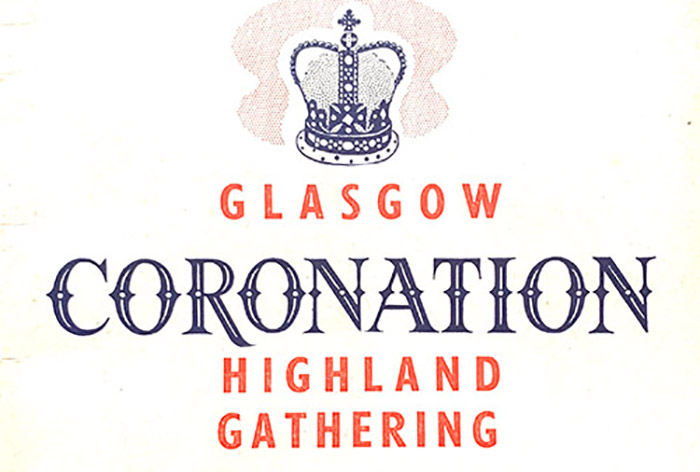
In 1953 it was decided that there should be a Coronation Highland Gathering to mark HM The Queen’s ascent to the throne. It was held at Ibrox Stadium on May 30th with 40 bands entering an ungraded contest. A special organising committee had been formed by the then Scottish Pipe Band Association and the competition rules they set raised more than a little debate and interest in piping circles.
The Gathering committee took the somewhat controversial decision to break from the tried and trusted March, Strathspey and Reel format. In a novel departure from the norm, they chose to initiate an original march tune competition – each band was to play a new tune of their choosing. By gracious permission of Her Majesty the Queen, the winning tune was to be named Salute to Her Majesty.
By Trevor Clydesdale
This decision did not go down too well in some circles with the Piping Times magazine accusing the SPBA of a ‘confidence trick’ because the association were giving a first prize of £10 but retaining copyright to the winning tune.
The secretary of the Gathering, Mr Alan Marshall, defended the decision stating that the SPBA, had asked for permission to retain copyright and the gathering committee had agreed. In their opinion it was in order to grant copyright control, intimating that any benefits accrued from it by the SPBA would naturally be used for the advancement of of piping in general by the association.
Almost 40 bands took part in the competition playing around 30 original compositions. The honour of taking first place went to Pipe Major David Ross of the Dalzell Highland band from Lanarkshire with the runners-up place going to Airdrie Highland under Pipe Major John Murray playing a tune composer by the noted composer William Bryson of Edinburgh.
Unfortunately I cannot lay my hands on the music for the winning tune and if anyone has it please forward to Piping Press.
As an aside to the competition, the Gathering saw the first appearance of World Champions Shotts and Dykehead since they lost six of their drum corps who either emigrated to Canada or were doing National Service. They had pulled together a drum corps and set about an intense practice regime in preparation for the up coming Worlds event later that summer.
All judges were under cover so there were no announcements to the audience of who was playing. The names were written on a blackboard which must have made it difficult to see for many listeners. Here are the bands and their tunes:
The welcome page in the programme, from the then SPBA President, Mr Hugh Macpherson, makes interesting reading: ‘Congratulations to the Glasgow Highland Gathering Committee on their foresight and initiative in instituting an original tune competition for pipe bands at their Gathering this year!
‘Then, too, the National Council of the Scottish Pipe Band Association were not found wanting when their support was enlisted in this novel departure. Too long have pipe bands been held to the traditional march, strathspey and reel idea and the experiment at Ibrox will be watched with keen interest by all pipe band enthusiasts at home and abroad.
‘It is rather interesting to note that Contest Promoters in Canada are keen on Slow March Competitions, and these are highly popular with spectators who sometimes find difficulty in following the intricacies of marches, strathspeys and reels.
‘Today, the Scottish Pipe Band Association is the largest of its kind in the world, with something like 264 bands in membership, representing more than 5,300 pipers and drummers. Pipe bands are still being formed up and down the country, and the end is not yet in sight.
‘Our friends in Ireland, both north and south, are keen supporters of the Association, and it is unique that this year, for the first time, the European Pipe Band Championship is scheduled to be held in Belfast. In 1951, three Canadian pipe bands took part in the Gathering of the Clans, so it may not be a figment of the imagination to suppose that a future World’s Championship may be held in Toronto or Sydney or even Dunedin [NZ].
‘From this prescribed uniformity of sound there results not a monotony but an intensity, an exaltation of musical expression.’ So wrote an eminent American authority on music after listening to the pipes at a famous Highland Gathering in Scotland, and Marion Keith, the Canadian Scottish authoress was indeed right when she wrote, ‘That glorious combination of sight and sound – a Highland piper.’
‘Let us stand together then to preserve for ever our glorious music, and posterity will bless our name!’
- About the author: Trevor began his drumming career with the Geoghegan Memorial in Northern Ireland in 1972 before moving to the McDonald Memorial junior and senior bands from 1978-86. He had a short spell at McNeilstown before joining the Pipes and Drums of the Northern Ireland Prison Service under the legendary Bobbie Rea. The McDonald Memorial reformed in 2011 and Trevor has led the drum corps to numerous titles including World, UK and Champion of Champions.